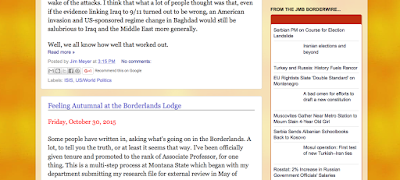Friday, March 11, 2016
Things have been pretty spectacular lately up here at the Borderlands Lodge, and I hope the same has been the case for you. Over winter break I was in Bozeman, mostly, and the spring semester began at MSU in mid-January.
 This semester I'm teaching an upper-division class in Soviet History as well as the senior capstone seminar, and much of the rest of my time has been spent reading, writing, and submitting grant applications for a new research project that I'm proposing.
This semester I'm teaching an upper-division class in Soviet History as well as the senior capstone seminar, and much of the rest of my time has been spent reading, writing, and submitting grant applications for a new research project that I'm proposing.
In other words, pretty much standard operating procedure for a professional academic.
One cool thing that happened lately was being interviewed, along with a number of other scholars, for an article on Eurasianet.org about Turkish-Russian relations.

The article, called "Turkey and Russia: History Fuels Rancor," was then picked up by a lot of places, including The Moscow Times and many other sites. And it was fun to see the piece scrolling on the JMB Borderwire.
Other sites running the piece were somewhat more comical. One of them appears to have been auto-translated back into English from the Russian-language version of the article, which was an interesting idea. This version identified me as a "Montana State University story highbrow," which is definitely going on my next set of business cards.
"History Fuels Rancor"
The title of the piece was actually at variance with the message that most of us who were interviewed actually had to say, but that's okay. Presumably the people running these sites know much more than I do about how to attract readers and clicks.
Nevertheless, the article raises an important issue: to what degree should we attribute agency to abstract concepts like "history?" Does "history" really fuel conflict, or rather do politicians and others invoke history as a means of justifying actions which are undertaken in the interest of contemporary concerns?
My view, and that of most of the other scholars who were interviewed for the article, is the latter. While historical memory is important, and can be invoked as a powerful rhetorical tool, the respective leadership circles in both Ankara and Moscow are doing what they do, I think, not so much because they are the helplessly swayed by "history," but rather because they see an advantage to their actions. "History" may be invoked as a means of justifying or explaining political actions, but is not the actual cause.
This is not always an easy argument to sell. In the United States, there is a particularly pronounced tendency to view international developments in terms of abstract concepts. Ask an American why there is so much fighting in the Middle East today, and chances are they'll mutter something about "Islam," or "Shiite-Sunny rivalry." Twenty years ago, Americans were equally eager to blame the wars in Yugoslavia on "ancient hatreds," as opposed to the contemporary interests of those who were involved in creating those wars. Perhaps because so many Americans tend to view their own government's role in the world in rather simplistic and idealistic terms ("spreading democracy," "bringing peace to the world"), there is a similar tendency to accept at face value narratives of world politics which assign agency to abstract (and usually timeless) principles. We see this even among otherwise sophisticated analyses of international affairs, which obsess far too much over narratives like "neo-Ottomanism" or "re-building the USSR" as a means of explaining political decisions made in Ankara and Moscow.
I'm not arguing that these narratives have no meaning, or that history doesn't matter. But for as long as we turn to abstract narratives as a means of explaining international politics, I think we are pretty much taking our eye off the ball. Whether or not we agree with them, the people making decisions in Ankara and Moscow are pursuing policies in Syria and elsewhere in response to what they see as their contemporary interests. No matter how often abstract concepts may be invoked to justify these policies, there are always contemporary interests that play a decisive role in their formulation.
Does any of this sound familiar? It should, because this is basically the argument that I make in my book. In Turks Across Empires I discuss a group of individuals who are known mainly for their connection to a form of identity, pan-Turkism, and look at how their invocations of identity and those of the people around them were grounded within much more tangible concerns. Muslim identity, I argue in this book, was "marketed" in a variety of ways by a vast array of individuals. By showing how invocations of identity are often based upon material concerns, rather than simply abstract concepts, I encourage the reader to look beyond these invocations when thinking about not only the past, but also the present day. In short: don't take these discourses at face value.
Without question, history matters. But that doesn't mean that we should fetishize it. And when "history" is invoked as a means of explaining other people's present-day political undertakings, the first thing we ought to do is to start digging deeper.
***
Also see:
Seeing Islam in the Violence
Erdogan's Newsweek Editorial and Turkish Diplomacy
Neo-Ottoman Silliness
Erdogan vs. Putin: The Streetfighter and the Agent Face Off
More on Turkey-Russia Conflict
***
180 librarians can't be wrong! Ask yours to order a copy of Turks Across Empires at the OUP website or from Amazon.
***
More links, commentary and photographs available at the Borderlands Lounge.
Things have been pretty spectacular lately up here at the Borderlands Lodge, and I hope the same has been the case for you. Over winter break I was in Bozeman, mostly, and the spring semester began at MSU in mid-January.
 This semester I'm teaching an upper-division class in Soviet History as well as the senior capstone seminar, and much of the rest of my time has been spent reading, writing, and submitting grant applications for a new research project that I'm proposing.
This semester I'm teaching an upper-division class in Soviet History as well as the senior capstone seminar, and much of the rest of my time has been spent reading, writing, and submitting grant applications for a new research project that I'm proposing. In other words, pretty much standard operating procedure for a professional academic.
 |
| In the hunt for research funding... |

The article, called "Turkey and Russia: History Fuels Rancor," was then picked up by a lot of places, including The Moscow Times and many other sites. And it was fun to see the piece scrolling on the JMB Borderwire.
Other sites running the piece were somewhat more comical. One of them appears to have been auto-translated back into English from the Russian-language version of the article, which was an interesting idea. This version identified me as a "Montana State University story highbrow," which is definitely going on my next set of business cards.
 |
| Montana State University Story Highbrow in action |
"History Fuels Rancor"
The title of the piece was actually at variance with the message that most of us who were interviewed actually had to say, but that's okay. Presumably the people running these sites know much more than I do about how to attract readers and clicks.
Nevertheless, the article raises an important issue: to what degree should we attribute agency to abstract concepts like "history?" Does "history" really fuel conflict, or rather do politicians and others invoke history as a means of justifying actions which are undertaken in the interest of contemporary concerns?
My view, and that of most of the other scholars who were interviewed for the article, is the latter. While historical memory is important, and can be invoked as a powerful rhetorical tool, the respective leadership circles in both Ankara and Moscow are doing what they do, I think, not so much because they are the helplessly swayed by "history," but rather because they see an advantage to their actions. "History" may be invoked as a means of justifying or explaining political actions, but is not the actual cause.
This is not always an easy argument to sell. In the United States, there is a particularly pronounced tendency to view international developments in terms of abstract concepts. Ask an American why there is so much fighting in the Middle East today, and chances are they'll mutter something about "Islam," or "Shiite-Sunny rivalry." Twenty years ago, Americans were equally eager to blame the wars in Yugoslavia on "ancient hatreds," as opposed to the contemporary interests of those who were involved in creating those wars. Perhaps because so many Americans tend to view their own government's role in the world in rather simplistic and idealistic terms ("spreading democracy," "bringing peace to the world"), there is a similar tendency to accept at face value narratives of world politics which assign agency to abstract (and usually timeless) principles. We see this even among otherwise sophisticated analyses of international affairs, which obsess far too much over narratives like "neo-Ottomanism" or "re-building the USSR" as a means of explaining political decisions made in Ankara and Moscow.
I'm not arguing that these narratives have no meaning, or that history doesn't matter. But for as long as we turn to abstract narratives as a means of explaining international politics, I think we are pretty much taking our eye off the ball. Whether or not we agree with them, the people making decisions in Ankara and Moscow are pursuing policies in Syria and elsewhere in response to what they see as their contemporary interests. No matter how often abstract concepts may be invoked to justify these policies, there are always contemporary interests that play a decisive role in their formulation.
Does any of this sound familiar? It should, because this is basically the argument that I make in my book. In Turks Across Empires I discuss a group of individuals who are known mainly for their connection to a form of identity, pan-Turkism, and look at how their invocations of identity and those of the people around them were grounded within much more tangible concerns. Muslim identity, I argue in this book, was "marketed" in a variety of ways by a vast array of individuals. By showing how invocations of identity are often based upon material concerns, rather than simply abstract concepts, I encourage the reader to look beyond these invocations when thinking about not only the past, but also the present day. In short: don't take these discourses at face value.
Without question, history matters. But that doesn't mean that we should fetishize it. And when "history" is invoked as a means of explaining other people's present-day political undertakings, the first thing we ought to do is to start digging deeper.
***
Also see:
Seeing Islam in the Violence
Erdogan's Newsweek Editorial and Turkish Diplomacy
Neo-Ottoman Silliness
Erdogan vs. Putin: The Streetfighter and the Agent Face Off
More on Turkey-Russia Conflict
***
180 librarians can't be wrong! Ask yours to order a copy of Turks Across Empires at the OUP website or from Amazon.
***
More links, commentary and photographs available at the Borderlands Lounge.


No comments:
Post a Comment